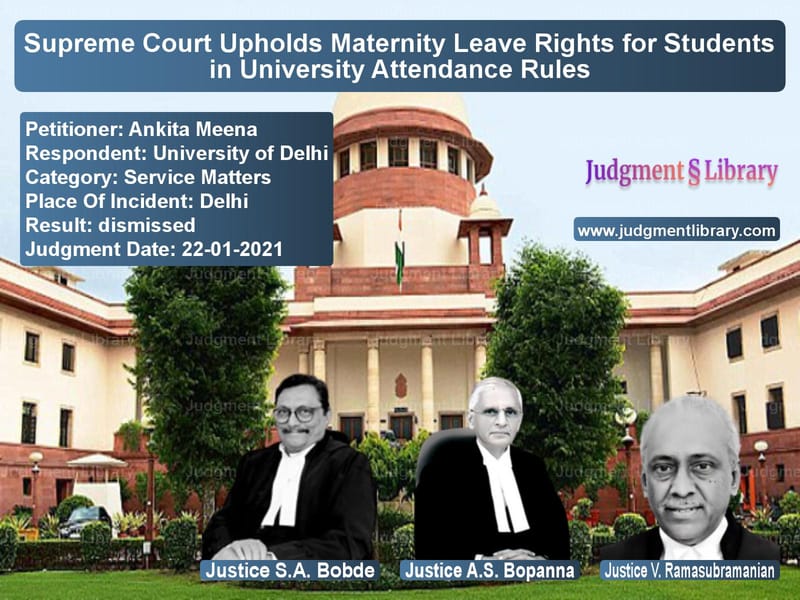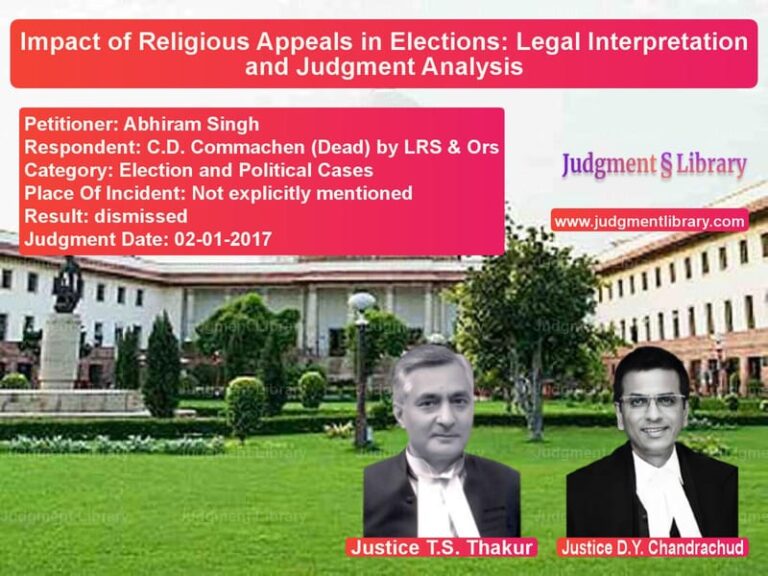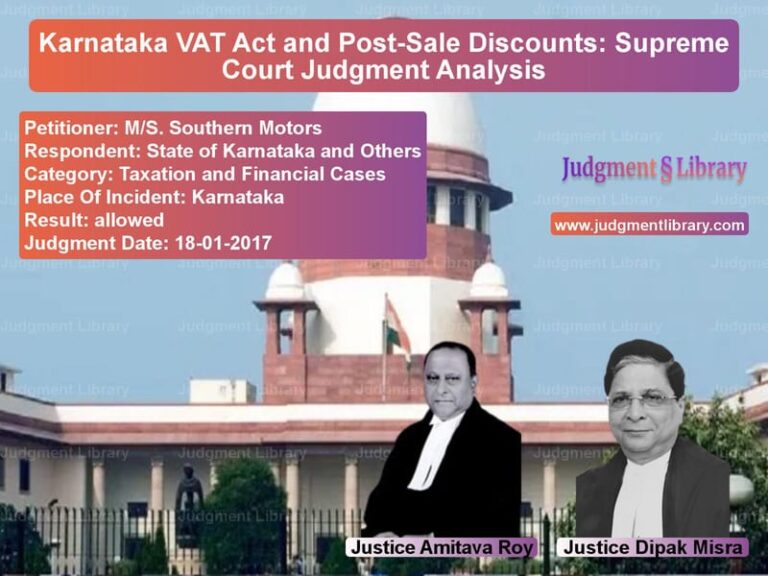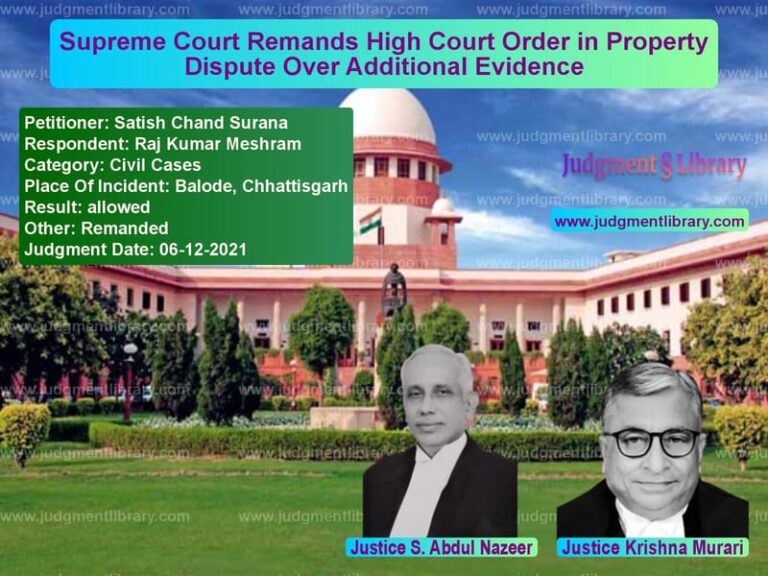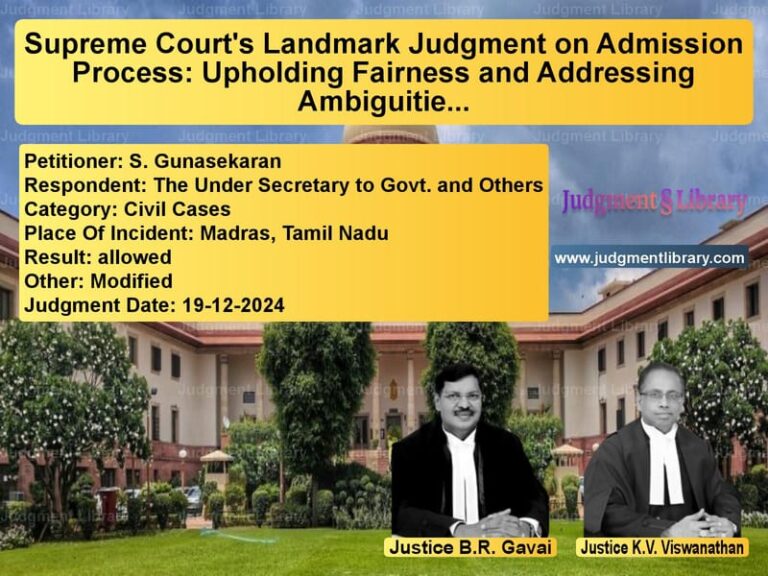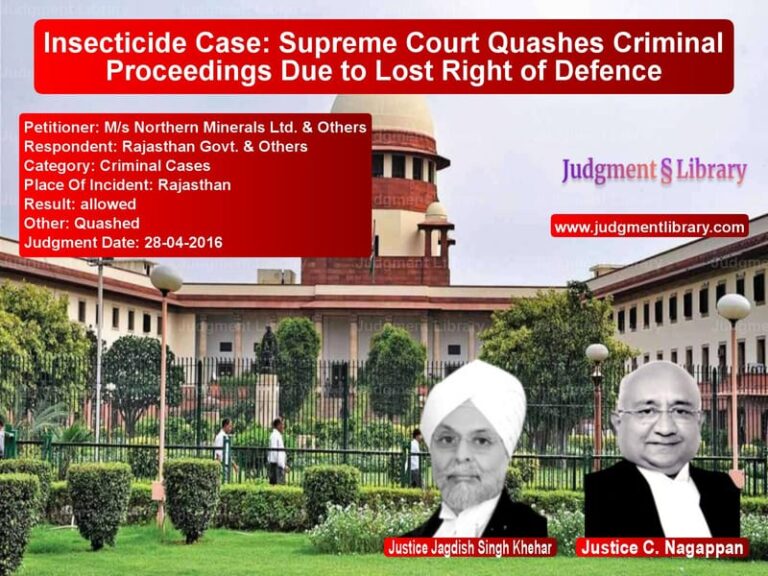Supreme Court Upholds Maternity Leave Rights for Students in University Attendance Rules
The Supreme Court of India, in the case of Ankita Meena vs. University of Delhi, addressed the critical issue of attendance requirements for students facing unavoidable absences due to maternity. The Court ruled on whether a student who failed to meet the minimum attendance requirement due to childbirth should be denied the right to appear for exams.
Background of the Case
Ankita Meena, a law student at the Law Centre-II, Faculty of Law, University of Delhi, was denied permission to appear for her fourth-semester LLB examination in May 2018. The University cited her failure to meet the required attendance percentage as per the Bar Council of India (BCI) Rules.
Meena had successfully completed her first three semesters. However, in the fourth semester, she missed several classes due to her pregnancy and the birth of her child on February 22, 2018. She applied for maternity leave but was still marked absent, leading to her detention from appearing in the exams.
Meena challenged the University’s decision in the Delhi High Court, which dismissed her plea. She then filed an appeal before the Division Bench, which upheld the Single Judge’s order, leading her to approach the Supreme Court.
Key Legal Issues Addressed
1. Whether Maternity Leave Should Be Considered for Attendance
The petitioner argued that her absence should be considered justified under maternity rights, and the university should have allowed an exemption from the mandatory attendance requirement.
2. Whether University Regulations Could Override Fundamental Rights
The petitioner contended that denying her the right to appear for the exam violated her fundamental rights under Article 14 (Right to Equality) and Article 21 (Right to Life and Dignity) of the Constitution.
3. Whether the Bar Council of India Rules Allowed Relaxation in Attendance
The respondent (University of Delhi) argued that Rule 10 of the Bar Council of India Rules made a minimum attendance of 70% mandatory and did not allow exceptions for maternity or any other reason.
Arguments by the Petitioner (Ankita Meena)
- Maternity leave is a fundamental right under Article 42 of the Constitution, which mandates the State to ensure just and humane conditions of work for women.
- The University should have granted an exemption, considering that pregnancy is a biological necessity, not a voluntary absence.
- Other academic institutions allow relaxation in attendance for maternity reasons.
- Failure to accommodate maternity leave would discourage women from pursuing higher education and professional courses.
Arguments by the Respondent (University of Delhi)
- Rule 10 of the BCI Rules strictly requires 70% attendance for law students.
- No provision exists for maternity leave or other special concessions.
- The student was informed about attendance rules at the time of admission.
- Allowing exemptions would set a precedent, leading to relaxation requests for various other personal reasons.
Supreme Court’s Findings
1. University Rules Cannot Be Overridden
The Supreme Court ruled that the University had correctly applied Rule 10 of the BCI Rules. The judgment stated:
“Academic regulations require adherence to minimum attendance, and exceptions cannot be made beyond the existing framework.”
2. No Specific Provision for Maternity Leave in BCI Rules
The Court observed that while maternity leave is a recognized employment right, there is no express provision for it in academic attendance rules. The judgment noted:
“The petitioner was aware of the attendance requirements at the time of admission and chose to continue the course. The court cannot modify academic policies beyond statutory limits.”
3. Consideration of Equity vs. Legal Mandates
While acknowledging the importance of maternity rights, the Court ruled that it could not direct the University to override established rules that are binding on all students. The judgment stated:
“Equity considerations cannot override statutory rules set by regulatory bodies.”
Supreme Court’s Verdict
- The appeal was dismissed.
- The University of Delhi was justified in denying permission for the fourth-semester exam.
- The Bar Council of India Rules on minimum attendance were upheld.
- The petitioner was permitted to continue her course but had to meet attendance requirements in future semesters.
Conclusion
This judgment clarifies the application of attendance rules in universities, reinforcing that:
- Students must comply with minimum attendance requirements, regardless of personal circumstances.
- Maternity leave is a recognized right in employment but does not automatically extend to academic settings unless explicitly provided for.
- Universities must follow statutory regulations and cannot grant exceptions beyond prescribed rules.
While the judgment upholds institutional regulations, it also highlights the need for policy reforms to address maternity leave in higher education.
Petitioner Name: Ankita Meena.Respondent Name: University of Delhi.Judgment By: Justice S.A. Bobde, Justice A.S. Bopanna, Justice V. Ramasubramanian.Place Of Incident: Delhi.Judgment Date: 22-01-2021.
Don’t miss out on the full details! Download the complete judgment in PDF format below and gain valuable insights instantly!
Download Judgment: ankita-meena-vs-university-of-delhi-supreme-court-of-india-judgment-dated-22-01-2021.pdf
Directly Download Judgment: Directly download this Judgment
See all petitions in Education Related Cases
See all petitions in Recruitment Policies
See all petitions in Judgment by S. A. Bobde
See all petitions in Judgment by A. S. Bopanna
See all petitions in Judgment by V. Ramasubramanian
See all petitions in dismissed
See all petitions in supreme court of India judgments January 2021
See all petitions in 2021 judgments
See all posts in Service Matters Category
See all allowed petitions in Service Matters Category
See all Dismissed petitions in Service Matters Category
See all partially allowed petitions in Service Matters Category

